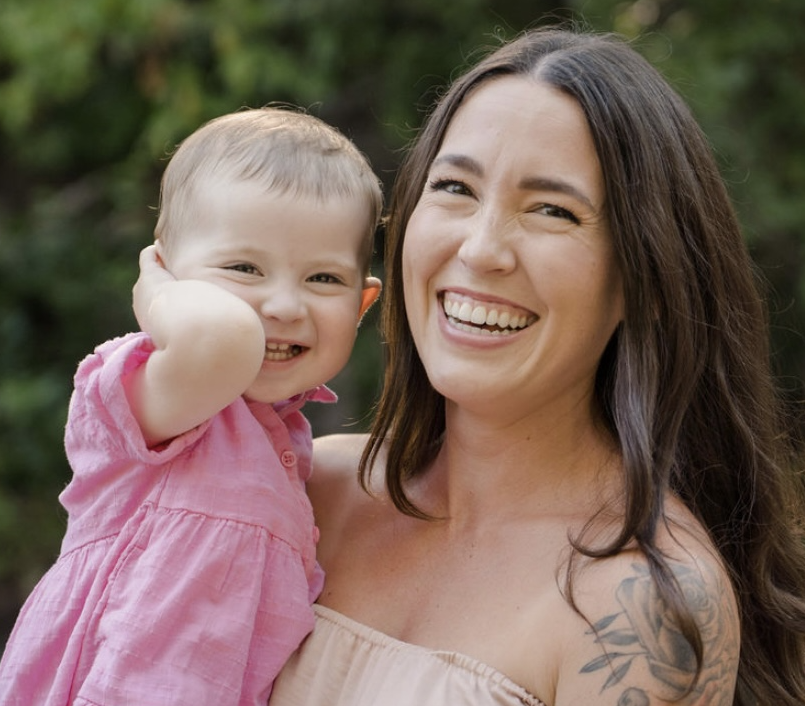Undergrad summer studentship leads to lifelong love of research for women’s heart-health researcher
6 February 2023

Nicole and daughter Madelyn
While pursuing her undergraduate degree in nursing at the University of Alberta, Nicole Tegg had the opportunity to complete a research summer studentship and was immediately hooked — she knew then that, no matter where her upcoming career as a registered nurse took her, she would one day return to pursue graduate studies.
After five years in obstetrics at the Misericordia Community Hospital, Tegg is now on the final leg of her master’s in nursing research, focusing on women’s heart health.
We spoke to Tegg about patiently working her way through grad school as a new mom, her research, what it’s like to work with mentor Colleen Norris, and what comes next in her academic journey.
What degree are you pursuing and what inspired you to embark on this path?
I started my master’s in nursing research, part time, while on maternity leave when my daughter was four weeks old. In fact, I kind of consider Madelyn an honorary student since she attended my first two years with me — classes were all virtual due to the pandemic.
During my undergraduate degree, I was fortunate to complete a research summer studentship and I loved the experience. I also loved obstetrics and wanted to gain bedside experience before returning for graduate studies. Working clinically as an RN allowed me to see the positive impact nursing research can have on clinical practice and further motivated me to pursue my master's. I am currently in my last course and will graduate this spring.
What inspired your interest in women’s heart health?
Learning about the significant differences in men's and women’s heart-health care and outcomes sparked my initial curiosity about women’s heart health. I was interested in knowing why these differences persist and what can be done to make positive change.
I have been fortunate over the years to hear personal stories from women with lived experiences of heart-health issues. It is always eye-opening and emotional to hear how challenging navigating health care can be for these women. It motivates me in my research to work towards improved care, treatment and outcomes for all women affected by heart-health concerns.
What’s the main focus of your research?
My research is focused on improving the quality of care for women affected by heart-health concerns. During my master’s, I completed a collaborative project with Heart & Stroke, which surveyed Canadian emergency departments for the use of female-specific heart protocols and identified an absence of those protocols. I have also been researching the impact of estrogen on women’s heart health across their lifespan, as knowledge gaps exist in what is known about this area.
What does it mean to you to be mentored by Colleen Norris?
It’s hard to know where to begin! To be mentored by Dr. Norris has made my master’s program and research an overwhelmingly positive experience. Her extensive knowledge of research — especially sex and gender research and women’s heart health — has been a key factor in my learning journey. Dr. Norris is easily approachable and contagiously enthusiastic about research. She is patient and understanding and encourages me in all my research endeavours. As the first person in my family to attend university, I have found university/academia challenging to navigate at times, and her mentorship has been an invaluable aspect of my success in my graduate studies.
How do you hope your research will impact women’s health?
I hope that the project we completed with the HSFC will set the stage for a larger quality initiative to identify if female-specific protocols can help improve outcomes for women presenting to emergency departments affected by heart-health concerns. I also hope my research on the impact of estrogen on women’s heart health can help close an existing knowledge gap and lead to improvements in women’s heart-health care, treatments and outcomes.
Where do you see your research going next?
Through my capstone project, I started a descriptive database of women who presented to an emergency department in Alberta, were discharged home and within 30 days were readmitted to the hospital having suffered a heart attack. With Dr. Norris’ ongoing supervision, I am collecting data on sex (biological) and gendered (psychosocial) factors from these women to build upon this database. Sex and gendered data such as menstrual history and gender roles are not routinely collected. Identifying how these factors can affect heart health is important to understanding women’s heart health. Using a biopsychosocial lens is essential in the quest to improve outcomes for women affected by heart disease.
What are your plans after graduation?
Hopefully a warm, relaxing summer! I applied for the PhD program in the fall. I am passionate about research and learning. I believe this is the next step for me in gaining the expertise needed to be successful as a nurse researcher.
What would you say to other RNs who might be considering grad studies?
Absolutely go for it! I have learned that there is no perfect time to pursue further education, but it is a worthwhile experience. I juggled motherhood, school and work, and options such as virtual classes and part-time studies made grad studies at the U of A accessible and manageable!
I loved so many things about my program — the people I met, the knowledge I gained and the variety of experiences I had. Grad studies are enriching both personally and professionally.
And speaking from a research lens, the knowledge and leadership skills you gain in grad studies can translate back into clinical care and help you improve the quality of nursing care and address areas for improvements in patient care.